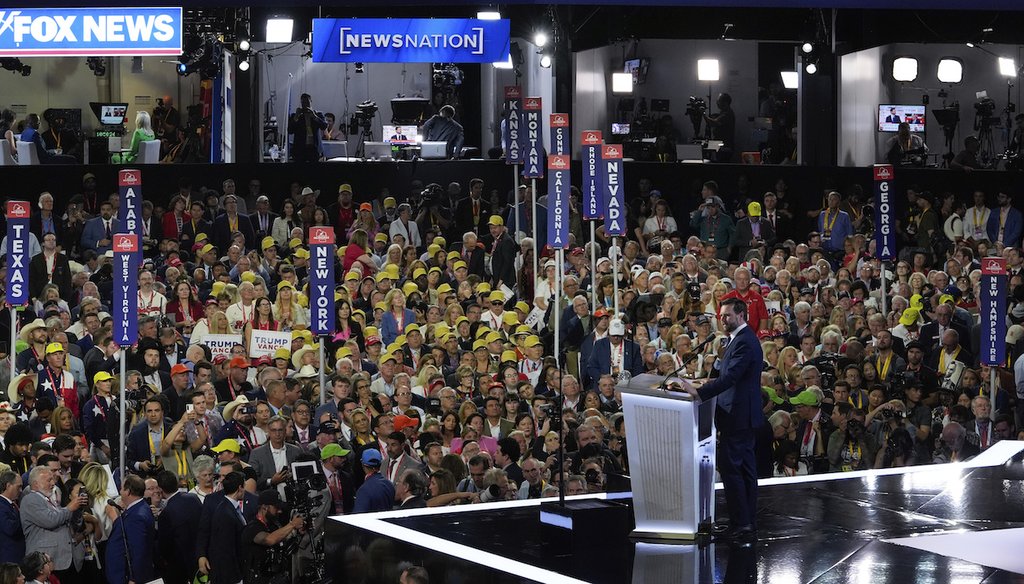Stand up for the facts!
Our only agenda is to publish the truth so you can be an informed participant in democracy.
We need your help.
I would like to contribute

Republican vice presidential candidate Sen. JD Vance, R-Ohio, speaks July 17, 2024, during the Republican National Convention in Milwaukee. (AP)
If Your Time is short
One message Republican National Convention speakers have repeated: The world was at peace under former President Donald Trump but is now on fire because of President Joe Biden.
Russia invaded Ukraine in February 2022 and Hamas attacked Israel in October 2023, things that never would have happened had Trump still been president because of his policies and perceived toughness, speaker after speaker argued.
Ohio Sen. JD Vance, the newly minted Republican vice presidential nominee, said in an interview with Fox News host Sean Hannity on the convention’s first day that when Trump was in office, there were "real growing peace movements all over the world," citing "no war in Europe" and the Abraham Accords — the September 2020 agreements that normalized diplomatic relations between Israel and the United Arab Emirates and Bahrain.
"Three years later, it seems like we have a conflict in every corner of the world," Vance said.
Other RNC speakers made similar arguments:
-
Former U.N. Ambassador Nikki Haley said: "When Barack Obama was president, Vladimir Putin invaded Crimea. With Joe Biden as president, Putin invaded all of Ukraine. But when Donald Trump was president, Putin did nothing, no invasions, no invasions, no wars. That was no accident. Putin didn't attack Ukraine because he knew Donald Trump was tough."
-
U.S. Rep. Elise Stefanik, R-N.Y., said: "Around the world, the feckless and failed Joe Biden has caused chaos — weakening our national security. From the catastrophic withdrawal from Afghanistan, to Putin’s invasion of Ukraine, to Hamas’ terrorist attack against our most precious ally Israel."
-
U.S. Rep. Brian Mast, R-Fla., added to the list the "Chinese Communist Party has Taiwan in their crosshairs."
-
Sen. Tim Scott, R-S.C., said "the weakness of the commander in chief has invited world wars all around our world."
It’s true that during the Trump administration there were no new major overseas wars or invasions. But during his time in office, there were still conflicts within Israel and between Russia and Ukraine.
Do Trump and Biden’s foreign policies, or each president’s projected image abroad, factor into current world conflicts? Experts told PolitiFact that there’s a limit to how much influence U.S. presidents have over whether a foreign conflict erupts into war.
"American presidents have scant control over foreign decisions about war and peace unless they show their willingness to commit American power," said Richard Betts, a Columbia University professor emeritus of war and peace studies and of international and public affairs.
Trump, Betts said, reduced expectations even among NATO allies that the U.S. would intervene militarily if attacked.
"Restraint in use of force is good, and the USA should not feel responsible for righting every wrong abroad, but Trump can't have it both ways — holding back from military commitments abroad but expecting to deter aggressors from acting against their neighbors," Betts wrote in an email to PolitiFact.
Richard Arnold, a Muskingum University associate political science professor, said Trump couldn’t have prevented Russia’s invasion of Ukraine "without simply selling out the Ukrainians and giving Putin what he wanted, or putting American armed forces in Ukraine."
Under Biden, the U.S. "hit the Russians with just about every non-military means of crippling their country and so far it has not worked," he said.
"This seems more like a talking point on which (Trump) can never be called because you can't get evidence either way," Arnold added.
Trump supporters say his projected strength would have deterred Russia, but Arnold said a president’s image would have little to do with what another country decides to do.
"Even ‘the most powerful man in the world’ operates within a system," Arnold said. Weariness of wars that started in the George W. Bush administration would have led the U.S. to fear getting troops involved in another foreign war, he said.
Although presidents can’t do much to prevent conflicts, they surely can guide the response, Arnold said.
Trump would likely not have strongly backed Ukraine as Biden has, he said.
"There would have been an agreement with Putin to let him take the eastern part of Ukraine in exchange for no resistance," Arnold said.
Betts noted that Russia was intervening militarily in the Ukraine’s Donbas region throughout Trump’s administration, and Trump couldn’t stop it. Nor did he do much to stop Syria’s chemical weapons use beyond an airstrike that had no influence, Betts said.
"If Trump had been in office in February 2022, Putin would have had every reason to assume he could get away with invading the rest of Ukraine since he had Trump in his pocket," Betts said.
Kenyan U.N. Ambassador Martin Kimani, the executive director of New York University’s Center on International Cooperation, said things would have turned out "significantly differently" in Israel and Ukraine if Trump had been president, citing the Abraham Accords.
"There’s no doubt in my mind that the prospect of the Abraham Accords being embraced by countries such as Saudi Arabia was one of the main causes of the Oct. 7 attack," Kimani said, adding that the accords aimed to circumvent "the Palestinian issue" and promote peace between Israel and its historical Arab enemies.
Hamas knew that such an attack would invite backlash and hinder the accords from progressing, Kimani said. Therefore, he said, experts "recognize that Trump already had a significant role in sparking or initiating the dynamics that led to Oct. 7."
Kimani also said Trump’s admiration for Putin "and the rapport they seemed to strike might have presented opportunities for negotiations that were certainly not to the advantage of the Ukrainians before the invasion, but might have headed off the war." Those negotiations would have likely come at a significant expense to Ukraine’s sovereignty, he added.
Kimani said Trump’s "willingness to talk to some of America’s greatest foes cannot be ignored."
If he returns to the White House, that willingness could result in more worldwide peace and security, he said.
"This would require a balance between wielding a big stick and offering a handshake to America's enemies," Kimani said. "Whether he has the discipline and ambition to take such a course remains to be seen."
Eileen Babbitt, a Tufts University professor of international conflict management, said whether a U.S. president can prevent a foreign war depends on how much the other countries rely on U.S. military, political or economic assistance and the current and historical relationship between the U.S. and those countries.
"U.S. presidents differ in the extent to which they are willing to exert pressure on other countries and what they believe to be in the strategic interest of the U.S.," Babbitt said.
Trump would have been less likely to pressure Russia or Israel than Biden has been because of Trump’s admiration for Putin and Netanyahu, Babbitt said.
Trump would not have prevented Netanyahu’s return to power or the "rightward swing of the ruling coalition," Babbitt said. "This then would have led to the same moves by Hamas and the resulting Israeli response."
She said Biden has continued negotiations on the Abraham Accords, seeking to bring Israel and Saudi Arabia together.
RELATED: Donald Trump and Joe Biden on Israel and Gaza: Comparing their positions
Our Sources
Fox News, 'Incredible honor': JD Vance reacts to becoming Trump's VP pick, July 16, 2024
Email interview, Ambassador Martin Kimani, the executive director of the NYU Center on International Cooperation, July 18, 2024
Email interview, Richard Arnold, Muskingum University associate political science professor, July 16, 2024
Email interview, Richard Betts, Columbia University professor emeritus of war and peace studies and of international and public affairs, July 16, 2024
Email interview, Eileen Babbitt, a Tufts University professor of international conflict management, July 18, 2024
U.S. State Department, The Abraham Accords, Sept. 15, 2020
PBS NewsHour, Nikki Haley speaks at 2024 Republican National Convention, July 16, 2024
PBS NewsHour, South Carolina Sen. Tim Scott speaks at Republican National Convention, July 15, 2024
Rep. Elise Stefanik, Instagram post, July 16, 2024
Rep. Brian Mast, US Rep. Brian Mast speaks at Republican National Convention, July 17, 2024
Center for Strategic and International Studies, Biden’s Efforts to Bring Saudi Arabia into the Abraham Accords, Sept. 22, 2023
Human Rights Watch, 2019 World Report: Israel and Palestine Events of 2018, accessed July 18, 2024
U.S. Treasury Department, Treasury Sanctions Russia over Continued Aggression in Ukraine, March 15, 2019
White House, Text of a Notice on the Continuation of the National Emergency with Respect to Ukraine, March 4, 2019

































